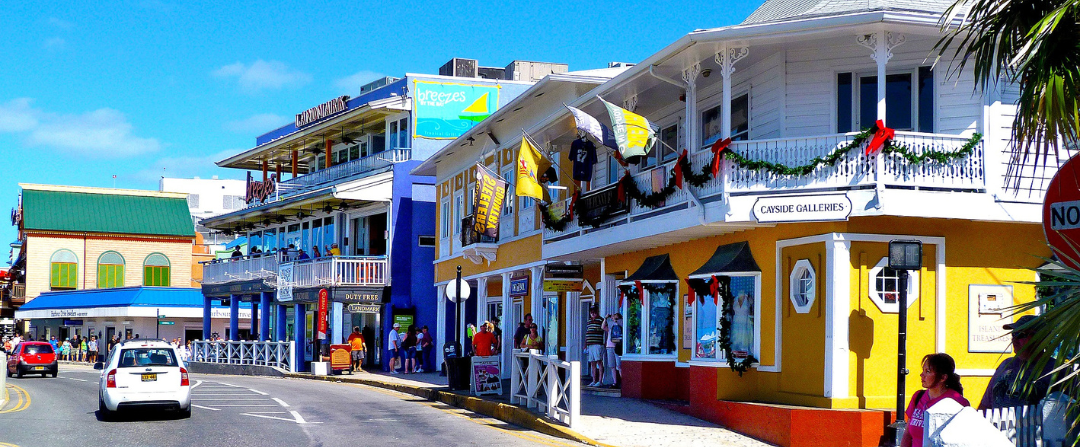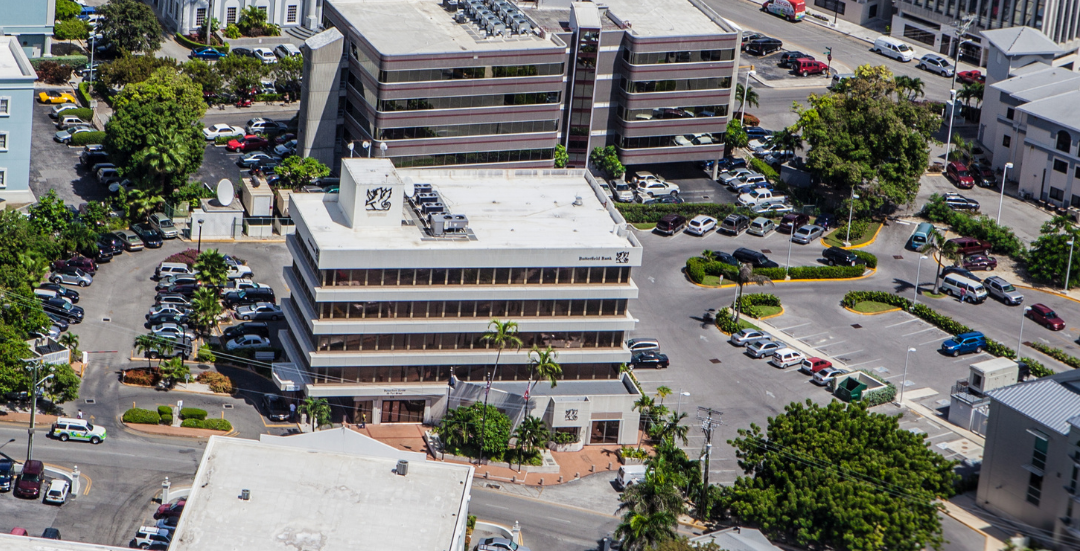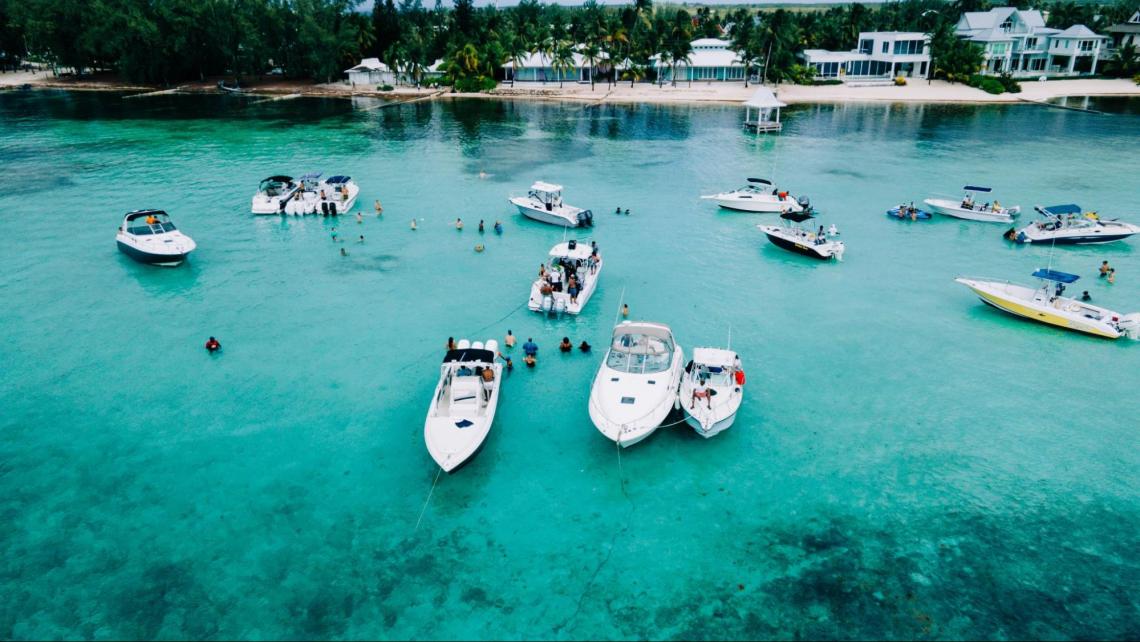Top Banks in the Cayman Islands
Located in the western Caribbean Sea, the Cayman Islands is a popular tax haven for the wealthy elite and multinational corporations.
Located in the western Caribbean Sea, the Cayman Islands is a popular tax haven for the wealthy elite and multinational corporations.

Considered 'tax neutral,' the Caymans do not have either corporate tax or direct resident taxation. This means no income tax, no property taxes, and no capital gain taxes.
The territory comprises three islands: Grand Cayman, Cayman Brac, and Little Cayman, located south of Cuba and northwest Jamaica. Its wealthy economy, robust banking, and beautiful beaches make it a tourist hotspot in the Caribbean.
Two major industries, the tourism and financial services sectors, are responsible for 50-60% of the total GDP of the Cayman Islands.
The Cayman Islands has been dubbed the "financial capital" of the Caribbean due to its notoriety surrounding offshore accounts as a tax haven. As Moody's economic indicators reported, more than 100,000 businesses are written in the Cayman Islands, much larger than the population of 65,720 reported in 2020.
What is a tax haven? A tax haven, such as the Cayman Islands or Switzerland, provides offshore banking for wealthy foreign individuals who avoid paying income tax in their country of residence.

Often using a shell company as an offshore subsidiary, large corporations redirect all sales and profits gained in their resident country, for example, the United States, towards this subsidiary to avoid paying income tax.
Avoiding the US corporation tax of 21% in 2022, corporations are subject to the income taxes of the governing location of their shell company.
The Caymans are especially popular with hedge fund managers as a result of no tax on interest or dividends earned on investments.
Structure of banks in the Cayman Islands
Considered one of the leading financial centers worldwide, the Cayman Islands is home to 158 banks. A staggering USD 80 billion have been deposited and are currently situated within these banks.

Per the Banks and Trust Companies Law, there are several different types of licenses the Cayman Islands Monetary Authority can offer a bank.
1. Category A banking license:
A "Category A" banking license allows banks to operate in local and international territories and, as a result, have the right to provide services to residents and non-residents.
Only 11 banks are offering this license in the Cayman Islands. This license is usually granted to a branch or subsidiary of international central banks such as HSBC or Deutsche Bank.
2. Category B banking license:
The remaining 147 banks hold a "Category B" banking license, where international banking services can be provided to non-residents.
Category B banks are known for offering offshore banking accounts for their international clients.
Top banks in the Cayman Islands
There may be 158 banks stationed on the Islands, yet all these banks operate differently and provide different services and specialties to their customers.

The following are some of the top banks that reside in the Cayman Islands:
1. Cayman National Bank
Granted a "Category A" license and established in 1974, Cayman National Bank boasts the largest ATM network on the islands. This license allows the bank to conduct business in domestic and international markets and provide services to domestic and overseas customers.
Since its inception, Cayman National Bank has handled over KYD 1.5 trillion in total assets. It provides services ranging from private banking to fiduciary services and investment management.
2. Scotiabank and Trust (Ltd)
Ranked as the number 1 best bank in the Cayman Islands for 2022, Scotiabank has operated there since 1968. The bank offers a complete range of retail and commercial banking services.
The bank holds a "Category A" banking license issued by the Monetary Authority. It can conduct business in domestic and international markets and provide services to customers across the globe.

3. Proven Bank (Cayman) Ltd
Formerly known as Fidelity, Proven Bank is a financial services group offering a comprehensible range of domestic and international banking as a "Category A" license holder. The bank provides retail and business banking services to domestic and offshore customers.
This bank requires a connection to the Islands through permanent residency. An initial deposit of only $500 is needed,
4. Butterfield Bank
Butterfield Bank provides specialized international financial services and corporate banking and treasury activities. In addition, it offers private banking and asset management under wealth management.
The bank holds a "Category A" banking license issued by the Monetary Authority and, just like Cayman National and Proven Bank, can conduct business in global markets and provide services to domestic and overseas customers.

5. CIBC FirstCaribbean International Bank
CIBC FirstCaribbean offers a full range of services as a central Caribbean bank in wealth management, treasury sales, and investment banking.
Despite the name, it is based in Canada and conducts corporate and investment banking services, including investment portfolio construction.
It holds a "Category A" banking license, conducts business in domestic and international markets, and provides services to customers worldwide.
6. Alhambra Bank & Trust Ltd
Created in just 2014, Alhambra holds a "Category B" license. This bank requires a minimum deposit of USD 1 million and focuses on servicing wealthy 'non-US' individuals.
As a "Category B" license holder, Alhambra is allowed to conduct international banking business with non-resident customers only and offers domestic banking services to domestic customers only.

7. Trident Trust Company (Cayman) Ltd
Trident Trust is an international bank that administers corporations and sets up family trust funds.
Operating in over seven countries worldwide, the bank holds a "Category B" license conducting international banking business with non-resident customers only and offering domestic banking services to domestic customers only.
Trident Trust commonly does business with brokerage and law firms, as well as other banks.
8. Merill Lynch Bank and Trust Company (Cayman) Ltd
Merill Lynch boasts an extensive product range, including forex transactions, interbank placements, and client deposits. The Cayman Islands branch has generated total assets of over KDR 4.1 million.
It holds a "Category A" banking license, conducts business in domestic and international markets, and provides services to customers all over the globe.

9. Alexandria Bancorp Ltd
Established in 1990, Alexandria Bancorp is based in Toronto, Canada. The bank offers its foreign clients both corporate and trust services, as well as wealth management. It is known as one of the foreign central banks on the Islands.
It holds a "Category B" banking license, conducts international banking business with non-resident customers only, and offers domestic banking services to domestic customers only.
10. Sackville Bank and Trust Company (Ltd)
Sackville Bank is a private boutique bank that provides fiduciary services alongside custodial services and strategic investment management solutions.
It holds a "Category B" banking license, conducts international banking business with non-resident customers only, and offers domestic banking services to domestic customers only.
Why use a Cayman Island Bank Account
The Cayman Islands financial sector is regarded as the world's 6th largest offshore banking center, helping to increase to the 7th largest GDP per capita while only being the 205th most populous country.

Known as transparent and professional, the Cayman Islands have developed a strong reputation for maximizing investors' international tax benefits through offshore banking accounts.
The islands are mainly known for their specialization of high-end individuals, large corporations, and conglomerates.
The Organization for Economic Co-operation and Development (OECD) recognizes the islands as a 'white list' country for their laws being of international tax standards.
A) Economic and political stability
The Cayman Islands has a very stable economic and political environment. This is crucial for where to place your assets, as it allows these assets to grow in sheltered conditions.
An estimated 50% of the world's largest 500 corporations have accounts set up in the Islands. However, as a British Overseas territory, the British government retains responsibility for all internal affairs, external affairs, and defense matters.
Under Moody's sovereign credit rating scale, the Islands receive a score of Aa3, the highest possible rating. This indicates that the country has been judged to be of the highest quality, with minimal risk regarding creditworthiness.
B) Banking Privacy
Banking secrecy laws in the Caymans are among the strictest in the world. Rules on formations of trusts are highly developed and contribute a great deal of privacy and protection to those involved.
Companies can be formed with extremely little paperwork, and shares of those companies are held anonymously through nominees.

C) Tax Neutrality
Being considered a 'tax-neutral' domain, the island has a rich history of providing a tax-free environment for either residents or non-residents.
Relevant legislation allows exempted corporations to register with the government for a written undertaking that they will remain tax-free.
The country offers:
- No income tax
- No capital gains tax
- No property tax
- No wealth tax
- No sales tax
- No inheritance tax
However, there are taxes on imported goods and stamp duties. Through these taxes, the government receives most of its income, in addition to tourist accommodation and departure fees.
D) Asset Growth
Banks stationed on the Islands offer a wide range of comprehensive investment opportunities, including some of the world's best private equity and real estate funds. In addition, it is estimated that 80% of offshore hedge fund firms are on the islands.
Investing through the Cayman Islands can provide an opportunity to invest in un domestically available funds. In addition, firms can concentrate on unique and alternative investments due to limited licensing provisions.
Documentation is needed to open a bank account

As an overseas resident, you'll need a legitimate reason for wanting to open a bank account in the Cayman Islands. The following information is also expected when applying for a bank account:
Full name, DOB, residential address, Phone number, Nationality, Occupation, Proof of identity, and residential address. The income source can be a rental contract, job letter, or a notarised copy from a property sale. A reference from your current bank - This must state the time spent with the existing bank, your average balance, and the demeanor and manner of your conduct with the account.
- Full name, DOB, and a residential address
- Phone number
- Nationality
- Occupation
- Proof of identity and residential address.
- The income source can be a rental contract, job letter, or a notarised copy from a property sale.
- A reference from your current bank - This must state the time spent with the existing bank, your average balance, and the demeanor and manner of your conduct with the account.
Of course, an initial deposit will also be needed to open an account. Deposits can range from USD 50,000 to $100,000. These initial deposits vary between banks, and a relationship with the bank can help to reduce those costs.
Private banking options on the Islands will require a significantly higher deposit, ranging up to USD 1 million.
Controversies
Over the years, leaked documents and court findings have revealed that many world leaders, politicians, fugitives, and con men have offshore investments based in the Caymans.
Most notable was the unraveling of a Cayman Islands fund portfolio that was invested in from the Queen of England's private estate. It is estimated that over GBP 7.5 million was placed in a Dover Street VI Cayman Fund LP fund.

Details of the Queen's offshore dealings were from a leak of company registries of over 19 tax havens called the 'Paradise Papers' in 2017.
Others revealed in the leak include:
- Bono (vocalist in U2).
- Juan Manuel Santos (Colombian President at the time).
- King Charles III.
- Famous singer Shakira.
One of the earliest money laundering cases is the Bank of Credits and Commerce International scandal.
In 1991, investigations of the bank uncovered a significant money laundering scheme using the Cayman Islands' blurry confidentiality laws to create a considerable amount of shell companies.
Through a sting operation by the FBI in 1996, the bank was implicated for being on a conspiracy to launder the profits made on the large-scale sale of cable television converters and descramblers in the US.
Recently, the Cayman Islands have doubled and intended to address all money laundering issues surrounding businesses in their country.




or Want to Sign up with your social account?